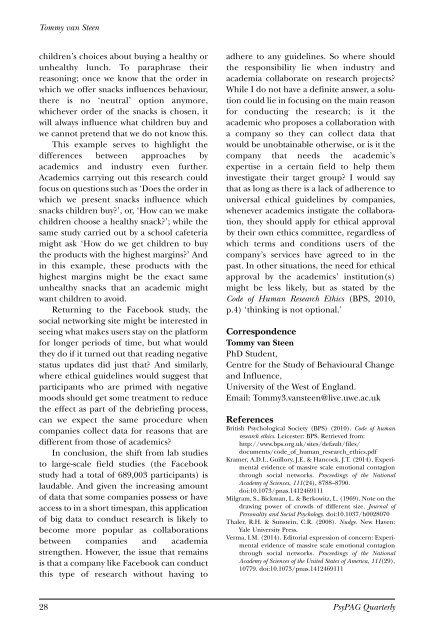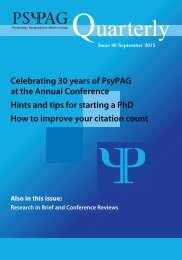Social Psychology Special Issue
XFCu7
XFCu7
Create successful ePaper yourself
Turn your PDF publications into a flip-book with our unique Google optimized e-Paper software.
Tommy van Steen<br />
children’s choices about buying a healthy or<br />
unhealthy lunch. To paraphrase their<br />
reasoning; once we know that the order in<br />
which we offer snacks influences behaviour,<br />
there is no ‘neutral’ option anymore,<br />
whichever order of the snacks is chosen, it<br />
will always influence what children buy and<br />
we cannot pretend that we do not know this.<br />
This example serves to highlight the<br />
differences between approaches by<br />
academics and industry even further.<br />
Academics carrying out this research could<br />
focus on questions such as ‘Does the order in<br />
which we present snacks influence which<br />
snacks children buy?’, or, ‘How can we make<br />
children choose a healthy snack?’; while the<br />
same study carried out by a school cafeteria<br />
might ask ‘How do we get children to buy<br />
the products with the highest margins?’ And<br />
in this example, these products with the<br />
highest margins might be the exact same<br />
unhealthy snacks that an academic might<br />
want children to avoid.<br />
Returning to the Facebook study, the<br />
social networking site might be interested in<br />
seeing what makes users stay on the platform<br />
for longer periods of time, but what would<br />
they do if it turned out that reading negative<br />
status updates did just that? And similarly,<br />
where ethical guidelines would suggest that<br />
participants who are primed with negative<br />
moods should get some treatment to reduce<br />
the effect as part of the debriefing process,<br />
can we expect the same procedure when<br />
companies collect data for reasons that are<br />
different from those of academics?<br />
In conclusion, the shift from lab studies<br />
to large-scale field studies (the Facebook<br />
study had a total of 689,003 participants) is<br />
laudable. And given the increasing amount<br />
of data that some companies possess or have<br />
access to in a short timespan, this application<br />
of big data to conduct research is likely to<br />
become more popular as collaborations<br />
between companies and academia<br />
strengthen. However, the issue that remains<br />
is that a company like Facebook can conduct<br />
this type of research without having to<br />
adhere to any guidelines. So where should<br />
the responsibility lie when industry and<br />
academia collaborate on research projects?<br />
While I do not have a definite answer, a solution<br />
could lie in focusing on the main reason<br />
for conducting the research; is it the<br />
academic who proposes a collaboration with<br />
a company so they can collect data that<br />
would be unobtainable otherwise, or is it the<br />
company that needs the academic’s<br />
expertise in a certain field to help them<br />
investigate their target group? I would say<br />
that as long as there is a lack of adherence to<br />
universal ethical guidelines by companies,<br />
whenever academics instigate the collaboration,<br />
they should apply for ethical approval<br />
by their own ethics committee, regardless of<br />
which terms and conditions users of the<br />
company’s services have agreed to in the<br />
past. In other situations, the need for ethical<br />
approval by the academics’ institution(s)<br />
might be less likely, but as stated by the<br />
Code of Human Research Ethics (BPS, 2010,<br />
p.4) ‘thinking is not optional.’<br />
Correspondence<br />
Tommy van Steen<br />
PhD Student,<br />
Centre for the Study of Behavioural Change<br />
and Influence,<br />
University of the West of England.<br />
Email: Tommy3.vansteen@live.uwe.ac.uk<br />
References<br />
British Psychological Society (BPS) (2010). Code of human<br />
research ethics. Leicester: BPS. Retrieved from:<br />
http://www.bps.org.uk/sites/default/files/<br />
documents/code_of_human_research_ethics.pdf<br />
Kramer, A.D.I., Guillory, J.E. & Hancock, J.T. (2014). Experimental<br />
evidence of massive scale emotional contagion<br />
through social networks. Proceedings of the National<br />
Academy of Sciences, 111(24), 8788–8790.<br />
doi:10.1073/pnas.1412469111<br />
Milgram, S., Bickman, L. & Berkowitz, L. (1969). Note on the<br />
drawing power of crowds of different size. Journal of<br />
Personality and <strong>Social</strong> <strong>Psychology</strong>. doi:10.1037/h0028070<br />
Thaler, R.H. & Sunstein, C.R. (2008). Nudge. New Haven:<br />
Yale University Press.<br />
Verma, I.M. (2014). Editorial expression of concern: Experimental<br />
evidence of massive scale emotional contagion<br />
through social networks. Proceedings of the National<br />
Academy of Sciences of the United States of America, 111(29),<br />
10779. doi:10.1073/pnas.1412469111<br />
28 PsyPAG Quarterly



